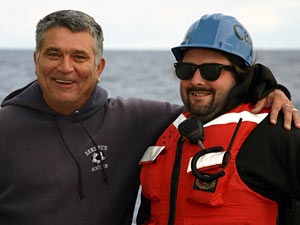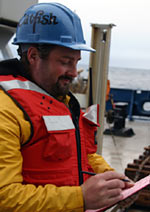Interviews: Seaman Ed "Catfish" Popowitz
 Atlantis Captain George Silva (left) and Ed “Catfish” Popowitz
have sailed together on research vessels from the Woods Hole Oceanographic
Institution since 1996. Atlantis Captain George Silva (left) and Ed “Catfish” Popowitz
have sailed together on research vessels from the Woods Hole Oceanographic
Institution since 1996.
Question:
What’s the story
behind your nickname “Catfish?”
Ed:
When I was eight or nine years old, I went fishing with friends
and I was the only one who caught a catfish, so they started using
it as my nickname. When I was a roadie I was known as Fast Ed but
when I started working on boats, I brought Catfish back because it
seemed more appropriate. I have the Catfish insignia on hundreds
of T-shirts, my safety helmet, my safety vest, and my foul weather
gear. I have it on my business cards, too. My next big thing will
be Catfish coffee mugs and guitar picks.
Question:
You work on a science research vessel, so do people assume
that you have a background in oceanography?
Ed:
The ship’s crew comes from all different backgrounds. Before
I began work for the Woods Hole Oceanographic Institution in 1996,
I was a roadie in rock bands. Most of the bands were local, Boston-based
groups. When I was just out of high school, focusing on music was
what I wanted to do with my life. Then a friend on the Atlantis
II suggested that I check out work on research vessels. Liking it had
a lot to do with good crewmembers. They taught me what I needed to
know.
 |
 |
| Ed “Catfish” Popowitz
earned his nickname after a childhood fishing trip in Massachusetts.
He works as an able-bodied seaman on Atlantis. |
Question:
From rock bands to oceanographic work… how
do your two careers compare?
Ed:
You know, this job is a lot like being a roadie. You set up
all kinds of technical stuff, get prepared for these important
events, and then you break it down, go somewhere else, and do it
again. First as a roadie and now as a seaman, I feel like I’m
helping people accomplish something important. I can't say if the
scientists or musicians are harder to work with. With both, you
just have to form a good working relationship, and I've been lucky
to have that with just about all the people I've met. There are
some differences, of course. I used to get free concert tickets
and backstage passes. Now I get tickets to the New England Aquarium.
Question:
Is the excitement level that exists in the music industry
there with oceanographic research?
Ed:
There are definitely moments when it is just as exciting. This
job can be an exciting challenge because you can't let anything
go. So much is riding on what you have to do. If one thing slides,
the whole expedition may slow down. But it's great because we do
so many different things. You're never bored, that's for sure.
Question:
Did you grow up near the sea?
Ed:
I'm from Hanover, Massachusetts, south of Boston. Now I live
in Middleboro Massachusetts. But of course I don't really live
there much, because I'm at sea eight months a year.
Question:
There are two types of seaman on this ship. There are
ordinary seamen. And then there are people like you—called able-bodied
seamen. What is the difference?
Ed:
Entry-level people working on the deck often start as ordinary
seamen. Then you can take tests and demonstrate seamanship skills,
like knot tying and boat launching, and you can move up to be an
able-bodied seaman. The next step after that is third mate, second
mate, and so on, if you want to keep progressing.
Question:
The ship sails worldwide for research. Where are some
of the places you have visited?
Ed:
I've been able to go all over the world: England, Ireland,
the Seychelles, Brazil, South Africa, Istanbul, and Malta. My favorite
places are Astoria, Oregon; San Diego, California, and Massachusetts.
Back in 1999 we went to Easter Island. That was so cool! I remember
reading about that place when I was a kid, dreaming about going
there. I've been to Stonehenge, too. Visiting these places are
good perks of the job.
Question:
What do you wish young people knew about your job?
Ed:
I hope that high school students know that this is a career
option if they don’t want to go to college right away, or
work a 9 to 5 job, or flip hamburgers for a living.
Question:
What are the best aspects of work on Atlantis?
Ed:
Meeting new people all the time. The scientist groups keep
rotating so it is never the same place. Also, Atlantis rides really
smooth in the water, and we've got a great DVD collection, a library,
e-mail, a workout room, and even ping-pong. Plus the crew is great.
There are so many experienced people here. A lot of us live near
Woods Hole, so when we're home we keep in touch. We're close as
friends, not just as coworkers. The friendships help us work better
as a team.
|
